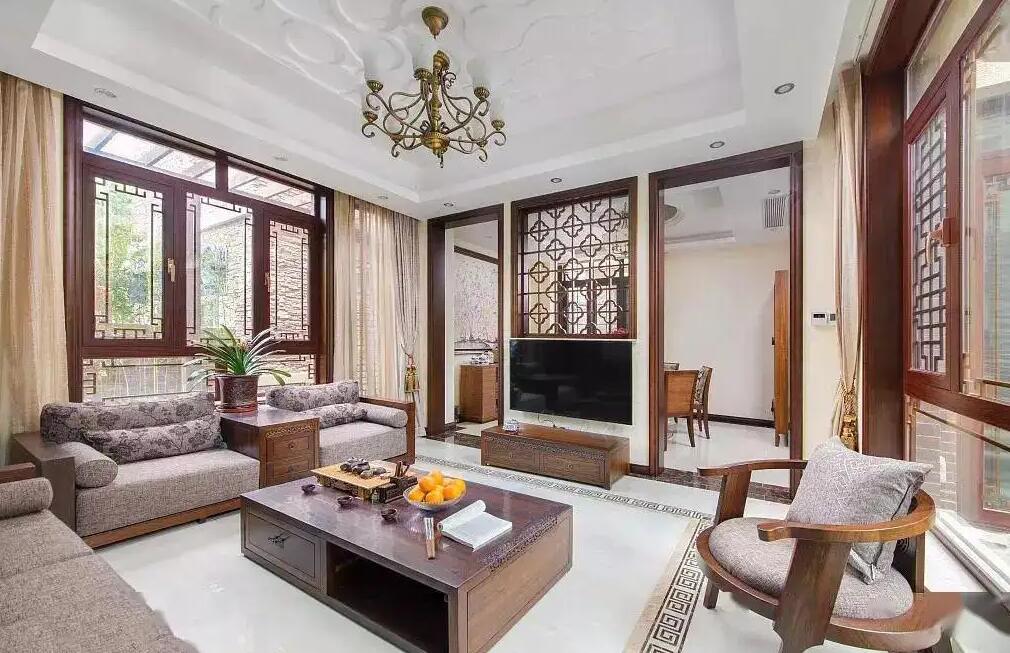Earlier we noted that front doors and entrances play a pivotal role in determining the quality of Feng Shui experienced in the household. The good news is, front doors and doors within the home are among the easiest things to adjust. The main elements to consider are their alignment and relationship to each other. It is considered inauspicious Feng Shui, for example, to place doors sequentially, particularly if one is the front door and one the back door. The Chinese claim it is bad manners to show guests the back door upon arrival. With doors positioned in this manner, negative Qi funnels too quickly through the home and positive Qi doesn't have a chance to circulate.
Doors are representative of our freedom, but they're also our barrier and protection from the world. The grander the main door, the more auspicious the home, it is believed. But beware of doors that are out of proportion to the home. Solid doors are preferable to transparent or see-through doors. And wood is better than glass or steel.
Too many windows in the dining room is inauspicious, since the aim is to gather Qi around a dining table and food prepared for loved ones.
Windows, which act as our eyes to the world, are important. But too many windows can create excessive yang, and too few can restrict the flow (excessive yin). Windows are best when they have a view of the outside world. Blinds, which prevent access to a view, are no good, while slatted blinds send cutting Qi into the room. Avoid closing curtains during the day, as they are associated with depression and vulnerability. Opt for sunlight instead - a much cheerier option. Beware of windows which only open halfway, as they restrict the amount of Qi entering a room. Ideally, windows should open fully and outward.
For those of us who don't have the luxury of manipulating the style of, or the view from, our windows, creating a window - box filled with herbs or plants could be the answer. By placing a window-box on the windowsill, we are filling our homes with the nurturing Wood energy of growing plants, while transforming a bleak outlook.
Modern Cures: Doors and Windows
Instead of drawing curtains during the day, try experimenting with other solutions, as large plants or colored or frosted glass. Whether in the bedroom or living areas of your home, these elements will enhance privacy and add energy to the space. While it is comforting to be reassured the world can't peer in, the aim should be to see out as much as possible.
As with light and privacy, airflow is another important Feng Shui consideration. If airflow is not an option in your bedroom, apply a small water feature containing oils. Hanging crystals from a beam or window is also a good idea.
Be scrupulous with the repair of doors throughout your home - especially the front door, as it's an indicator of energy flowing through the house. Make sure they don't squeak, creak or have broken latches. Keep a wedge or doorstop close by so they don't slam. Keep doors freshly painted in bright, vivid colors. A colorful doormat is also a good idea.
Where there are two or more doors facing each other in a row, break up the perspective by hanging low lights, positioning semi-circular tables, or placing broad-leafed plants between the doors to slow down Qi.
Chinese hand-painted furniture is another creative way to slow down Qi in problematic areas of the home. This furniture is not only elegant, the whimsical images are good Feng Shui. The hand-painted scenes usually depict cultural life in rural China, with figures at social gatherings, operatic events, in villages, and on horses. Try using lacquered armoirs, chests, screens or consoles.
It's considered good Feng Shui to make sure that rooms are well ventilated and filled with light. Be careful about how you dress your windows - blinds, such as those shown here, prevent access to views, and slatted blinds send cutting Qi into the room.
Curtains, an alternative to slatted blinds, were added to this sun-filled bedroom. Make sure that curtains are kept open during the day, as keeping them closed can be associated with depression and vulnerability. Also, beware of windows which only open halfway - they restrict the amount of Qi entering a room.
This old stable, which has been converted into a home, has ample natural light flooding in from overhead skylights, but keeping the door closed throughout the day means its residents miss out on pleasant views and a sunny aspect.
Because the owner is keen to maintain privacy, but still have the luxury of good views, the door is kept ajar during the day (weather permitting) and fabric used as a fluid, transparent screen. The aim with Feng Shui in the home - while maintaining privacy, good ventilation and access to light - is to be able to see out as much as possible.
